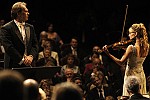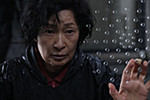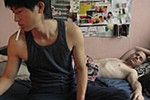 Shadows off the beaten path
Shadows off the beaten pathMOTHER | SOUNDLESS WIND CHIME
< < F O R E I G N > >
last update 19.Jul.10
See also: SHADOWS FILM FESTIVAL
 R E V I E W B Y R I C H C L I N E
R E V I E W B Y R I C H C L I N E
prd Tarak Ben Ammar, Marina Berlusconi
with Francesco Scianna, Margareth Made, Lina Sastri, Angela Molina, Nicole Grimaudo, Salvo Ficarra, Valentino Picone, Gaetano Aronica, Alfio Sorbello, Lollo Franco, Gaetano Sciortino, Monica Bellucci

release It 25.Sep.09,
US Jan.10 psiff, UK 23.Jul.10
09/Italy 2h31
VENICE FILM FESTIVAL
TORONTO FILM FESTIVAL
 A robust epic spanning some 70 years of Sicilian history, this is a sprawling production that's certainly impressive to watch. Although filmmaker Tornatore throws way too much at the screen, leaving us exhausted in the process.
A robust epic spanning some 70 years of Sicilian history, this is a sprawling production that's certainly impressive to watch. Although filmmaker Tornatore throws way too much at the screen, leaving us exhausted in the process.
In the 1920s, Peppino (Scianna) is born in the spirited town of Baaria (aka Bagheria) in northern Sicily. As he grows up, he falls for local girl Mannina (Made), whose family doesn't approve, and gets increasingly involved in politics, working with the communist party to protect people's rights from both the oppressive government and the mafia. Over the years, they have five children, including the precocious and imaginative Pietro (Scortino), who becomes obsessed with cinema.
Baaria is also where Tornatore was born, so the film is clearly a labour of love, drawing on his personal family history and early memories. He also seems to employ Sicily's entire population as extras for frequent crowd scenes, which are thrillingly shot and edited. He also vividly recounts Italian history through the eyes of earthy Sicilians who are often at odds with both the distant Italian government and the mafiosos who try to control their lives.
Yes, the film is assembled on a massive scale, infused with strong Latin passions that continually echo in Ennio Morricone's swelling score. The expansive settings are seriously impressive, while smaller bits of movie magic tie things together inventively, although the livelier early scenes are a lot more engaging than the draggy political section. But all of it is energetic, infused with anarchic humour and huge emotions as these people are confronted with big decisions, a variety of adventures and life-and-death experiences over the decades.
Being a series of anecdotes, the film lurches through Peppino's life without much momentum. The larger scenes capture the community's feisty resilience, but overall the film is so crowded and far-reaching that it's not easy to remember who's who; only Peppino and Mannina really develop as characters. But Scianna and Made add charm and personality to the local details--customs, superstitions, apocryphal stories and scores of vivid side characters. And even though it's awash with Tornatore's usual golden-hued sentimentality, this is a fascinating, important and beautifully made film that rather overstays its welcome.
18.Jul.10
 R E V I E W B Y R I C H C L I N E
R E V I E W B Y R I C H C L I N E MUST
MUST  SEE
SEE
prd Alain Attal
with Alexei Guskov, Melanie Laurent, Dmitri Nazarov, Valeriy Barinov, Francois Berleand, Miou Miou, Anna Kamenkova Pavlova, Aleksandr Komissarov, Lionel Abelanski, Roger Dumas, Guillaume Gallienne, Ramzy Bedia

release Fr 4.Nov.09,
UK 16.Jul.10, US 23.Jul.10
09/France Europa 1h59
 This riotous French farce stirs in both Russian mob action and some strong emotion in a way that kind of defies both description and expectation. But it's brilliantly held together by the music at the centre of the story.
This riotous French farce stirs in both Russian mob action and some strong emotion in a way that kind of defies both description and expectation. But it's brilliantly held together by the music at the centre of the story.
Andrei (Guskov) was a great conductor until he clashed with Brezhnev in 1981. He's now a cleaner at Moscow's Bolshoi Theatre, and when he intercepts a fax he decides to reclaim his reputation by gathering his old orchestra buddies and illicitly taking a high-profile gig in Paris with the help of his pal Sacha (Nazarov) and their pushy old manager Ivan (Barinov). Meanwhile, Andrei will also need to face up to his past, most notably to Tchaikovsky's violin concerto, as well as rising-star French violinist Anne-Marie (Laurent) and the high-spirited orchestra members.
The film has a lively, funny tone from the start, packing the screen with big personalities and raucous dialog. Writer-director Mihaileanu cleverly maintains a completely out-of-control vibe without ever losing a single plot strand or character. He also helps us vividly engage with the characters; we feel their desperation to reclaim their reputations and right the wrongs of the past, and as the film progresses we also start to understand their raw passion for the music. So when the final scenes come along, the film wallops us with a huge wave of never-sentimentalised emotion.
In other words, this is gorgeously orchestrated filmmaking, keeping us riotously entertained with believable, hilarious characters while underscoring everything with strongly resonant themes. Most effective is the notion that music is good for the soul (this film proves that). There are also several scruffy, rude gags along the way to keep things realistically grounded. And even if the script is packed with French, Russian, Jewish and Gypsy stereotypes, it continually subverts them to make a point.
Meanwhile, the cast is terrific. Guskov is a superb central character, letting us glimpse just enough of his inner life to know that there's a much bigger story here than we are seeing. Laurent is simply wonderful in a role that could have been pretty simplistic, but isn't. And after the farcical build-up, the concert scene at the end is a clever combination of music, acting, cinematography and editing that catches us wonderfully by surprise.
12.May.10
 R E V I E W B Y R I C H C L I N E
R E V I E W B Y R I C H C L I N E
scr Park Eun-kyo, Bong Joon-ho
prd Park Tae-joon, Seo Woo-sik
with Kim Hye-ja, Won Bin, Jin Goo, Yoon Jae-Moon, Jun Mi-sun, Lee Young-suck, Song Sae-beauk, Na Mun-hee, Chun Woo-hee, Kim Byoung-soon, Jang Pil-kyeong, Mun Hee-ra

release Kor 28.May.09,
US 12.Mar.10, UK 20.Aug.10
09/Korea 2h08
CANNES FILM FEST
TORONTO FILM FEST

 Striking direction from the gifted Bong Joon-ho (THE HOST) makes this dramatic thriller both darkly unnerving and powerfully moving. It's a superbly well-assembled film with surprises in store every step of the way.
Striking direction from the gifted Bong Joon-ho (THE HOST) makes this dramatic thriller both darkly unnerving and powerfully moving. It's a superbly well-assembled film with surprises in store every step of the way.
Do-joon (Won) is a mentally simple young man who lives with his mother (Kim Hye-ja). He's also utterly oblivious to the bigotry he receives everywhere he goes, and his best pal Jin-tae (Jin) doesn't really help matters as he stirs up the people around them. Then a young girl is found murdered, and a detective (Yoon) arrests Do-joon because he's the handiest scapegoat. This sends Mother into action to find the real killer and to mete out her own revenge.
From a simple but brilliant opening shot, Bong holds us firmly in his grip, finding jagged floods of joy and pain lurking in the corners of every scene. The story is packed with blackly hilarious observations, cruel comedy and deep emotion as this tiny, unassuming woman quietly battles to protect her son from anything that might cause him harm. In other words, despite the film's sharp edges and grisly story, this is an affectionate ode to motherhood.
Kim Hye-ja's marvellous face conveys her thoughts and feelings without the need for much dialog, and Bong captures every tiny glance as she's persistently distracted by whatever might be happening to her son. Won is also effective in a difficult role, balancing Do-joon's wonder and naivete with a murky sense of menace. His interaction with Jin, as the friend who's smarter but not as good-looking, is terrific. And side characters have personality tics that are just as lively.
And then there's the quiet commentary on Korea's justice system, as the cops callously disregard evidence to close the case quickly. Clearly, Do-joon isn't capable of murder, although we quickly realise that Mother is. The ensuing tension is edgy and unexpected, keeping us off balance trough each twisted turn of the plot. And along with all of this, Bong offers us telling insights that show us the truth but convince us of something else. Intriguingly, the film's closest relative is probably David Lynch's Blue Velvet and yes, Bong's filmmaking is just as bravura.
13.Jul.10
 R E V I E W B Y R I C H C L I N E
R E V I E W B Y R I C H C L I N E
prd Philip Delaquis, Kit Hung, Min Li Marti, Stefan Zuber
with Lu Yulai, Bernhard Bulling, Wong Siu Ying, Li Fong, Wella Zhang, Hannes Lindenblatt, Gilles Tschudi, Ruth Schwegler
 release HK 23.Jul.09,
release HK 23.Jul.09, UK 5.Oct.10 (dvd)
09/China 1h40


 Dreamlike and insinuating, this Hong Kong drama is edited so completely out of sequence that it's not always clear what's happening, but it's full of strongly emotional scenes that are strongly evocative even without much dialog.
Dreamlike and insinuating, this Hong Kong drama is edited so completely out of sequence that it's not always clear what's happening, but it's full of strongly emotional scenes that are strongly evocative even without much dialog.
Ricky (Lu) works in a Hong Kong restaurant but is constantly called home to Beijing to take care of his dying mother. Through a series of events he meets Pascal (Bulling), a Swiss street performer who's desperate to escape his abusive boyfriend (Lindenblatt). Soon Pascal moves in with Ricky, but their friendly romance doesn't go too smoothly, even after Pascal gets a good job at a local preschool. All of this is seen through the prism of Ricky's memories as he travels to Switzerland and meets a guy who looks just like Pascal.
The fractured structure and extremely minimalist storytelling are a challenge from the start, as filmmaker Hung refuses to tell us what's happening until the very end. In some ways, this effectively keeps us hooked as we work to untangle Ricky's random memories and cling to whatever clues we can find along the way. But since there are also dream sequences woven in, we're never quite sure what's real.
Instead, we admire the gorgeous cinematography and suggestive editing, as well as the natural performances. Both Lu and Bulling manage to sharply convey their characters' thoughts and feelings without saying much at all. And Zhang injects some spice as Ricky's hooker-aunt. But most of the dialog is pretty irrelevant, and Hung also leaves much of the action is off screen. The romance between Ricky and Pascal is only suggested, as are key events that emerge along the way.
The result of all of this understatement is a film that feels strangely lightweight despite its serious subject matter. Essentially this is a story about the fragility of life and relationships, two things that can't really be grasped but have to be enjoyed while we have them. It's a downbeat film from the very start, and the slow pacing requires constant attention in order to make sense of it. But patient viewers will be surprised by how moving it is, even if they can't quite make sense of it all.
8.Jul.10


See also: SHADOWS FILM FESTIVAL
© 2010 by Rich Cline, Shadows
on the Wall